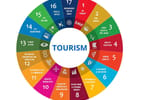The results of the most recent consumer Pulse Poll on innovation in travel over the past century were revealed today. The survey of U.S. consumers found that when considering whether to buy travel products, services or experiences, 73% of leisure travelers care “a lot” or “somewhat” about whether those offerings are innovative.
While 79% of the poll respondents reported being either “pleasantly surprised” or “fairly comfortable” when they hear something has changed or is about to change, millennials (ages 23-38) are three times as likely (15% vs. 5%) as traditionalists (ages 74 and older) to “eagerly await” an innovation in a travel-related service that they’ve used consistently. Conversely, traditionalists are nearly three times as likely as millennials (17% vs. 6%) to react with ambivalence or annoyance when learning that such an innovation is forthcoming.
In terms of the single most innovative travel development over the past century, 79% of consumers cited the Wright brothers’ first flight. The debut of GPS car navigation systems came in second (56%), while the first commercial passenger flight came in third (50%). Other travel developments that rated a 1 on an innovation scale of 1-6, with 1 meaning “most innovative,” included:
• First transatlantic flight (50%)
• Advent of online travel booking (43%)
• Debut of wheeled suitcases (33%)
Only 17% of the polled consumers rated the advent of ride-sharing services (i.e., Uber and LYFT) a 1 for innovation, and only 15% of respondents rated the launch of home-sharing services (such as Airbnb, HomeAway and VRBO) a 1. Other innovations that some of those surveyed rated a 1 for innovation included the debut of:
• Expedited airport security/Customs/immigration processing programs — i.e., TSA Pre✓®, Global Entry, CLEAR (30% of respondents scored these a 1 for innovation)
• Bullet trains in Europe (23%)
• Seat-back entertainment systems (21%)
• The Concorde jet (20%)
• In-flight Wi-Fi (17%)
• Self-service kiosks for ticketing/check-in (17%)
• Suitcases with tracking technology (15%)
• Frequent-flyer reward programs (13%)
• Suitcases with USB charging ports (10%)
• Vacation time-share properties (3%)
Finally, when considering whether to buy travel products, services or experiences, 60% of respondents feel it’s important that the provider of these offerings has been around for 75 years or more. While 25% of baby boomers (ages 55-73) agree that this is important, only 7% of millennials do.
WHAT TO TAKE AWAY FROM THIS ARTICLE:
- , Uber and LYFT) a 1 for innovation, and only 15% of respondents rated the launch of home-sharing services (such as Airbnb, HomeAway and VRBO) a 1.
- Other travel developments that rated a 1 on an innovation scale of 1-6, with 1 meaning “most innovative,” included.
- In terms of the single most innovative travel development over the past century, 79% of consumers cited the Wright brothers' first flight.






















